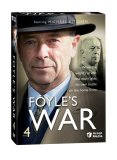| Reviews & Columns |
|
Reviews DVD TV on DVD Blu-ray 4K UHD International DVDs In Theaters Reviews by Studio Video Games Features Collector Series DVDs Easter Egg Database Interviews DVD Talk Radio Feature Articles Columns Anime Talk DVD Savant Horror DVDs The M.O.D. Squad Art House HD Talk Silent DVD
|
DVD Talk Forum |
|
|
| Resources |
|
DVD Price Search Customer Service #'s RCE Info Links |
|
Columns
|
|
|
Foyle's War - Set 4
Acorn Media will be releasing Foyle's War: Set 4, which includes the last four movies from Series 4 and 5: Invasion, Bad Blood, Bleak Midwinter, and Casualties of War. Created and written by the prolific Anthony Horowitz (the Alex Rider novels, Midsomer Murders, TV adaptations of Hercule Poirot novels), Foyle's War immediately fascinated me with its determined emphasis on telling stories about England's homefront during WWII, stories that examine complex moral and ethical choices associated with living under the strain of a world at war, and which receive at least as much attention as the standard mystery sub-plots that anchor and identify the films as accomplished examples of the "English country murder" genre.
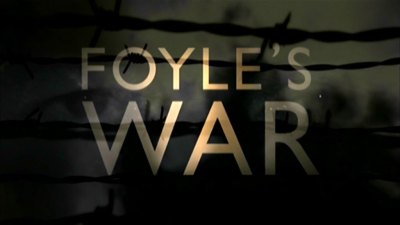
Set in Hastings, East Sussex, in and around the beaches of South East England, during the bleak, dark years of 1942 and early 1943, Foyle's War: Set 4 tells the story of Christopher Foyle (Michael Kitchen), a Detective Chief Superintendent employed by His Majesty's government to keep the peace on the homefront during WWII. Aiding Foyle is Detective Sergeant Paul Milner (Anthony Howell). A policeman before the war, he subsequently enlisted, losing a leg in battle, only to return to policework at the urging of Foyle. Samantha Stewart (Honeysuckle Weeks) is a member of the Mechanized Transport Corps, and the driver for Foyle. She's also quite good at helping Foyle and Milner in their investigations, acting more like a colleague rather than just a driver.
Making Foyle's job more difficult (or at least more varied) are the new pressures - as well as new crimes - that come with the nation going on full military effort. Foyle's investigations now frequently involve the black market, illegal gambling, the production of illegal, deadly "hooch" (moonshine), and military sabotage, as well as the standard thefts and murders that still crop up. Perhaps the most quiet, still, laconic detective you'll ever see on television, Foyle's M.O. never varies: quite observation, desert dry wit, zero reaction upon even the most extreme provocation, and carefully chosen, clipped, spare sentences that sum up much, much more than one first assumes. Nothing seems to ruffle Foyle, although it's clear he feels deeply about his colleagues and about his duty. That dedication to duty, and even more, his dedication, love, and utmost respect for the law, keeps Foyle constantly at odds with others who see the war as yet another excuse to flout the conventions of the legal systems - as well as a convenient bypass for committing morally questionable actions.
That thread - the circumstances of war on the civilian, and the use of those pressures as excuses for illegal activity - is what I found most fascinating about Foyle's War. Putting in the first disc of Foyle's War: Set 4, I wasn't sure what to expect. I assumed it would be a standard "English country" mystery, with a colorful, but insignificant, WWII background. But Foyle's War does just the opposite. The mysteries merely serve as backdrops for telling stories about the war, and how civilians coped with new pressures and circumstances with the coming of this momentous, seismic change in their society. And they're not facile issues with pat, easy answers; they can raise uncomfortable feelings in the viewer. The first film, Invasion, looks at the arrival of American engineers in an, at best, 50-50 positive/negative light. A central character in the story openly wishes Hitler had come rather than the Americans, and the usual cliche that has every Briton looking upon the arriving Yanks with an indulgent smile is questioned. Of course, Foyle, always the soul of even-handedness, proposes tolerance, suggesting people see the Yanks' side of the story, coming into a war they didn't see as their own. However, even with Foyle's reserved appreciation of the reality of the situation, it's clear that Invasion brings up some uncomfortable questions about the loss of a way of life in rural England that resulted with the Americans coming to Britain's aid.
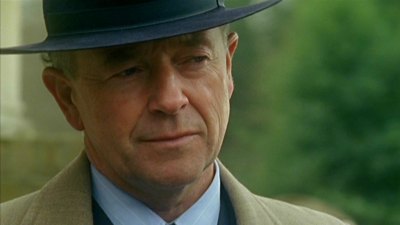
Foyle's War excels at bringing up issues related to WWII that you won't normally see in standard television dramas that use that conflict as a historical backdrop. The final film, Casualties of War, is really a fascinating look at the expediencies of the war effort - a societal effort that most films elevate over all other moral or ethical considerations - in conflict with the simple rule of law. A worker whose efforts are vital to national security is involved in a premeditated murder. Foyle knows it. His superiors know it. And His Majesty's government, all the way up to its highest members, know it. And yet that person walks. It's a devastating moment for Foyle, a moment where he realizes the law that he respects more than anything else in the world, has been subverted like so many other traditional elements of society, in the name of the war effort, forcing him to make a momentous decision about his future in law enforcement.
It was creator and writer Anthony Horowitz's stated intention to have the homefront stories of Foyle's War take precedence over the mysteries, and while that exercise is completely successful artistically, I would have liked the mysteries in Foyle's War to be just a tad more complex, perhaps more on a level with the writing and ideas that come forth from the homefront sub-plots. It's not that the mysteries are poor by any means; it's just that they're standard tales of red herrings and "surprise" end-of-story revelations that won't necessarily fool die-hard mystery fans. The mystery angles don't quite measure up to the complexities of the homefront subplots, and there are times when you get the feeling that the mechanics of the mysteries are rushed through, to get on with the whole thing, once Horowitz has made his point thematically. It's really just a minor quibble, because the episodes as a whole are so well produced and directed, that any convenient coincidences or obvious red herrings are quickly forgotten in the episode's overall impact.
And really, I can't stress enough how much of that impact is related to the performance of Michael Kitchen. A veteran British character actor, Kitchen's tranquil, still performance is wonderfully spare. Reduced to the barest bones, Kitchen's technique here puts the viewer on the alert any time he shows up on screen, making the viewer watch carefully for even the smallest gesture or expression that conveys so much more than the few words he's given to speak. It's one of the most adept examples of underplaying I've ever seen. And wisely, the other actors take a cue from Kitchen, keeping their characterizations suitably low-key to avoid bouncing off the screen in comparison to Kitchen. Kitchen's subtle, imperturbable, self-possessed performance perfectly matches the tone of the Foyle's War: Set 4 episodes, giving the viewer an uniquely thoughtful series of mysteries that focus more on moral and ethical choices rather than bloodletting.
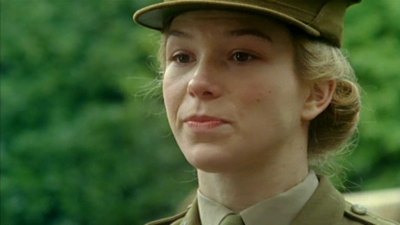
Invasion
April 1942. Cultures clash as the first Americans arrive to build an airfield near Hastings. Some locals see the "invaders" as a threat. Others find the chance for romance among the young G.I.s. But when a barmaid turns up strangled, Foyle's investigation strains British-American relations to the breaking point.
Bad Blood
August 1942. Helping a colleague from a nearby town probe the murder of a war hero, Foyle confronts a deeper -- and potentially deadlier -- mystery. A top-secret experiment in biological warfare goes horribly wrong, claiming the victim's widow and threatening the life of Foyle's driver.
Bleak Midwinter
December 1942. The death of Grace Phillips, a young worker in a local munitions factory, arouses suspicions. The subsequent murder of Detective Paul Milner's estranged wife, Jane, seems to confirm that Grace's death was no accident. But the evidence points to Milner himself as Jane's murderer.
Casualties of War
March 1943. While investigating a gambling ring and incidents of sabotage, Foyle becomes distracted by a personal crisis. His troubled goddaughter, Lydia, shows up unexpectedly at his doorstep -- along with her young son James, a boy so deeply traumatized by a bomb strike at his school that he refuses to speak.
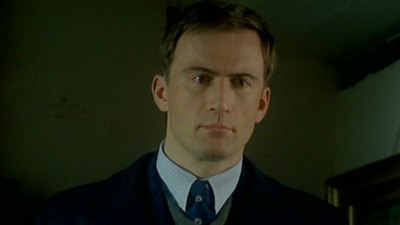
The DVD:
The Video:
The widescreen, enhanced for 16x9 TVs, 1.78:1 video image for Foyle's War: Set 4 looks particularly good, with deep, rich colors and no compression issues (helped by the fact that each episode gets its own disc).
The Audio:
The English 2.0 stereo sound mix is quite good, with optional close-captioning.
The Extras:
All of the episodes from Foyle's War: Set 4 contain a The Truth Behind... text bonus that looks at the real history incorporated into the stories. The same text cast biographies are included on each disc, and Invasion features a short making-of documentary that's more brief than informative.
Final Thoughts:
Complex moral and ethical questions of the efficacies of the war effort and its effect on the British civilian population are at the forefront of the Foyle's War: Set 4 mysteries. While the mysteries themselves are well-done (if somewhat familiar), the placid, thoughtful, unruffled performance of Michael Kitchen as the laconic Detective Chief Superintendent Christopher Foyle sets the tone for these composed but complicated meditations on war, the rule of law, and personal responsibility in the face of societal change. I highly recommend Foyle's War: Set 4.
Paul Mavis is an internationally published film and television historian, a member of the Online Film Critics Society, and the author of The Espionage Filmography.


|
| Popular Reviews |
| Sponsored Links |
|
|
| Sponsored Links |
|
|
| Release List | Reviews | Shop | Newsletter | Forum | DVD Giveaways | Blu-Ray | Advertise |
|
Copyright 2024 DVDTalk.com All Rights Reserved. Legal Info, Privacy Policy, Terms of Use,
Manage Preferences,
Your Privacy Choices | |||||||









